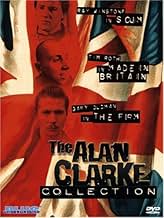IMDb RATING
7.6/10
2.9K
YOUR RATING
This is the hard and shocking story of life in a British borstal for young offenders. The brutal regime made no attempt to reform or improve the inmates and actively encouraged a power strug... Read allThis is the hard and shocking story of life in a British borstal for young offenders. The brutal regime made no attempt to reform or improve the inmates and actively encouraged a power struggle between the 'tough' new inmate and the 'old hands'.This is the hard and shocking story of life in a British borstal for young offenders. The brutal regime made no attempt to reform or improve the inmates and actively encouraged a power struggle between the 'tough' new inmate and the 'old hands'.
Ray Winstone
- Carlin
- (as Raymond Winstone)
Philip DaCosta
- Formby
- (as Philip Da Costa)
- Director
- Writer
- All cast & crew
- Production, box office & more at IMDbPro
Storyline
Did you know
- TriviaIn the Roy Minton original play of Scum, he had the Carlin character as a Glaswegian, someone who hales from Glasgow, Scotland. He cast Ray Winstone in both the TV and cinema versions for the way in which he walked.
- GoofsThis film was actually released in 1991. The new dress code for the legal profession in England didn't come into effect until 2007. Judges and barristers still wear them for criminal cases. Archer's description of the magistrate would actually be factually correct.
- Alternate versionsThere are differences between the TV and the theatrical version:
- It is shown in 1.33:1 aspect ratio.
- Any punches, slaps or kickings are muffled.
- There is a scene with the 3 new arrivals having a bath in the TV version and not in the theatrical version. Davis complains about the water being too warm and gets slapped.
- No strong language was used in the TV version.
- Archer and Carlin talking to each other for the first time differs between the two versions. In the TV version, they talk to each other in the laundry whereas in the theatrical version, a changing room.
- Banks bullying Davis is slightly different. In the tv version Banks grabs Davis and slaps him and tells him that he is the daddy here and pays his dues like the rest. When Davis says he doesn't smokes, Banks slaps him again. In the theatrical version, he does something similar but kicks Davis as he stood up and shoves him back onto the bench.
- In the TV version, Davis getting bullied again. Richards pours hot tea on him and Mr. Sands shouts at Davis for being a slob.
- The TV version omits a scene with Archer talking to the Matron about vetos on books.
- In the TV version, Mr Greaves asks Carlin about his bruised face. The theatrical version is similar but Mr Sands asks Carlin about his face.
- The TV version omits Meakin asks the Matron when is she going to call them by their first names.
- Bank's beating by Carlin is similar in both versions. In the tv version, Carlin dunks Bank's head in the sink and hits him a few times and calmly declares himself the new daddy. He finally kicks kicks him once in the groin. The theatrical is similar but Carlin is more angrier.
- Baldy's beating by Carlin is fairly brief. The sound effect when Carlin beats him with the pipe is muffled.
- Toyne's suicide is deleted in the TV version.
- There is a brief scene with Archer painting "I am happy" on a wall. This is not in the TV version
- Carlin's homosexual relationship with another inmate is in the TV version.
- Davis' rape is brief and non graphic compared to the graphic and prolonged film version. His suicide is not as graphic as the theatrical version.
- After the riots, Carlin is taken to the punishment block and beaten up. The theatrical version is similar but more graphic.
- The credits has music unlike the theatrical version.
- ConnectionsReferenced in Neverwhere (1996)
- SoundtracksWide Boy
Written by Rick Lloyd
Performed by The Amazing Mike Kahn Band
Featured review
Alan Clarke's film introduced us to a powerful new talent in Ray Winstone. Undeniably brutal but an allegory on the worship of simple governance by power. This film, coupled with another film, "Made in Great Britain" with Tim Roth was an indictment of the Thatcher type anti-society policies. Ray Winstone builds his part slowly, gathering power and authority during his stay in the institution and is climaxed when he says "who's the daddy now?" It was such a powerful performance that I always wait with anticipation his next outing and have rarely been disappointed.
- allan95073
- Apr 25, 2001
- Permalink
Details
Box office
- Budget
- £125,000 (estimated)
Contribute to this page
Suggest an edit or add missing content


























